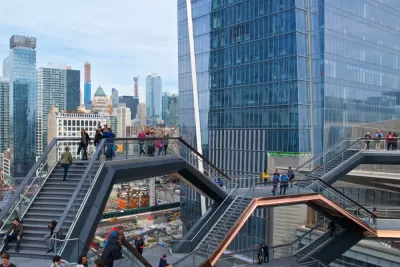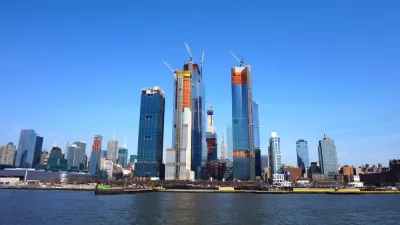In-depth reporting on the history and present of Related Cos., the developer of several of the largest mega-developments in the United States.

From Chicago to New York to Los Angeles to the Silicon Valley and more, various wings of the Related Cos. are developing some of the most ambitious, most expensive, and most conspicuous projects in the country.
Patrick Sisson writes of the confluence of factors that have brought the development market to this moment to preview the role of Related in it all:
More than a decade into the current economic cycle, demand for downtown real estate hasn’t abated. Since most of the easily developable land has been bought and sold many times over, cities and developers have been giving more complicated locations a second look.
The remaining areas ripe for redevelopment—such as waterfronts, rail yards, and huge abandoned industrial sites—are generally in prime locations and well-connected from an infrastructure perspective. But developing them requires expertise, capital, and planning. It requires being able to wait out years of approvals and planning meetings and navigate bureaucracy, to think big and master plan entire new neighborhoods, and to risk money for what can be a decade-long process.
With those complications in mind, Sisson places the Related Cos. at the center of the entire historical moment, with massive projects like Hudson Yards in New York City and The 78 in Chicago. "Owned by Stephen Ross, whose net worth is pegged at $7.7 billion by Forbes, Related, and its wide array of domestic and international divisions, has over $50 billion in real estate assets," according to Sisson, who provides a history of Ross and the company while also detailing some of the signature projects in the company's portfolio, and their potential to impact the cities where they'll be built.
FULL STORY: How the megadevelopment era shapes cities today

Alabama: Trump Terminates Settlements for Black Communities Harmed By Raw Sewage
Trump deemed the landmark civil rights agreement “illegal DEI and environmental justice policy.”

Planetizen Federal Action Tracker
A weekly monitor of how Trump’s orders and actions are impacting planners and planning in America.

How Atlanta Built 7,000 Housing Units in 3 Years
The city’s comprehensive, neighborhood-focused housing strategy focuses on identifying properties and land that can be repurposed for housing and encouraging development in underserved neighborhoods.

In Both Crashes and Crime, Public Transportation is Far Safer than Driving
Contrary to popular assumptions, public transportation has far lower crash and crime rates than automobile travel. For safer communities, improve and encourage transit travel.

Report: Zoning Reforms Should Complement Nashville’s Ambitious Transit Plan
Without reform, restrictive zoning codes will limit the impact of the city’s planned transit expansion and could exclude some of the residents who depend on transit the most.

Judge Orders Release of Frozen IRA, IIJA Funding
The decision is a victory for environmental groups who charged that freezing funds for critical infrastructure and disaster response programs caused “real and irreparable harm” to communities.
Urban Design for Planners 1: Software Tools
This six-course series explores essential urban design concepts using open source software and equips planners with the tools they need to participate fully in the urban design process.
Planning for Universal Design
Learn the tools for implementing Universal Design in planning regulations.
Jessamine County Fiscal Court
Caltrans
Institute for Housing and Urban Development Studies (IHS)
City of Grandview
Harvard GSD Executive Education
Toledo-Lucas County Plan Commissions
Salt Lake City
NYU Wagner Graduate School of Public Service





























